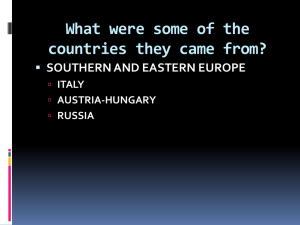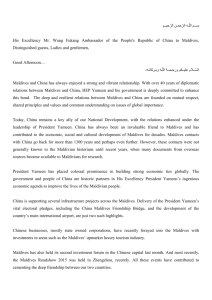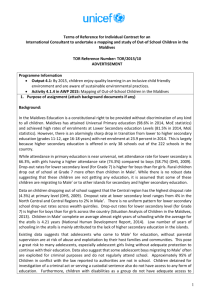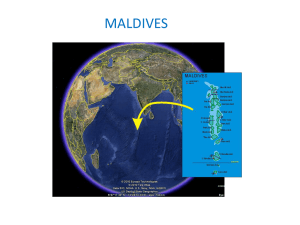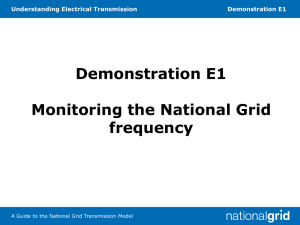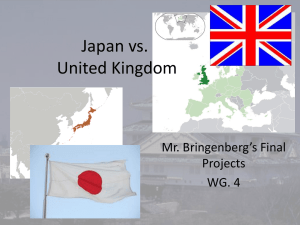The Need for an Energy Grid in the Maldives
advertisement
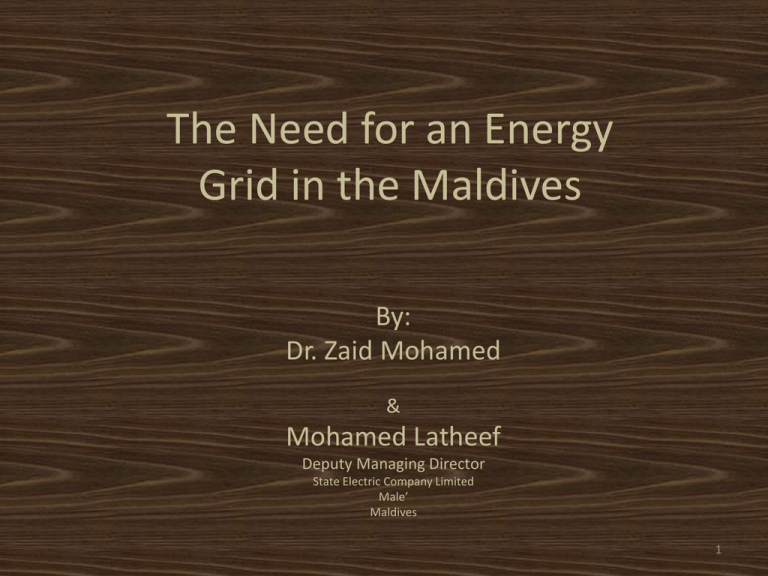
The Need for an Energy Grid in the Maldives By: Dr. Zaid Mohamed & Mohamed Latheef Deputy Managing Director State Electric Company Limited Male’ Maldives 1 Maldives Capital City 2 (inhabited island) Greater Male’ Region) Thilafushi (Industrial) Male’ (Capital City) Hulhumale’ Villingili (Developing City) Male’ International Airport Statistics Total Population 298,968 Population in the Capital 102,377 Percentage In the Capital 34% Number of Islands 1190 Inhabited Islands 185 Number of Atolls 26 Administrative Provinces 7 4 STELCO History • The State Electric Company Limited (STELCO) is an entirely State owned organization responsible for the generation and distribution and sale of electricity to consumers through out the North Central Province (NCP) of the Republic of Maldives. • STELCO was formed back in 1949, as a government department - Electricity Department. The service started with the use of a 14kW generator providing electricity to only 50 consumers of Male’. • Over the 63 years of service, the institution was re-named from Electricity Department to Maldives Electricity Board (MEB) and then on 19 June 1997 the name was changed to State Electric Company Limited (STELCO) as a totally state owned company by a Presidential Decree. • By end of 2008 STELCO expanded services from North to South of the country totaling 28 islands catering 60% of the total population of Maldives. 5 STELCO Today • In 2009 with the new government policies, 7 provinces were formed with utility companies managing all utility services in their own respective provinces. As a result, on 1st May 2009 STELCO handed over 22 island power houses to these utility companies. • STELCO now provide its services to 28 islands in NCP with over 33000 consumers and total installed capacity of 78.38MW covering 37% of the population of Maldives. • Diesel power plants are mainly used in STELCO • 1 MW of Solar PV installed in Male’ and few other islands under various projects. 6 Male’ • Current peak demand in Male’ is 41MW • Total Installed capacity is 61.42MW 7 Male' - Firm Capacity versus Peak Load [MW] - 2006 to 2015 65.00 Largest Gen-set Out (8/9) 60.00 55.00 7.20 7.20 7.20 7.20 DG 8+9 / 16.0 MW (MAN) 50.00 TMP 9-15 / 10.08 MW (Cummins at Gaakoshi PH) 45.00 40.00 [MW] TMP 7-8 / 3.2 MW (Cummins at Canteen area) 35.00 TMP 1-6 / 5.4MW (Cummins at Fenmeeru Hingun) 30.00 25.00 DG 1 - 7 / 26.6 MW (Wartsila) 20.00 Peak Load Actual 15.00 10.00 Linear Peak Load 5.00 0.00 2006 2007 2008 2009 2010 2011 Year 2012 2013 2014 2015 8 Challenges in Expansion & the Need for a Grid • Male’ is congested • Land Availability • No available space in Male’. • Exhaust Emission Limitations • When the current power project is completed power plant emission will reach to maximum acceptable limit • Power System Protection • Will reach maximum allowable production capacity based on system Voltage (appx.55MW) • Network Overloading • Male’ 11kV distribution network requires upgrades and expansion Power Generation outside capital island Male’?? 9 Potential Future Locations • Hulhumale • Land is available • Future load center • Minimal distance (economically more viable) • Thilafushi • Land is available • Future load center (commercial activities) • Long distance 10 11 12 Island Electrification • • • • • • Average size of each island is small Population less than 1000 on average Power demand is low Cost of operation very high Revenue is small Operational loss 13 Regional Interconnection Grids • Improves reliability and system efficiency • Phase 1: Interconnect islands in the same reef – More than 2 islands in the same reef – These power systems can be interconnected – Consider possibility of having larger power plants • Phase 2: Interconnect islands across 2 or more reefs within the atoll. • Phase 3: Interconnect the grids across atolls. 14 15 Carbon Neutral Maldives • Until 2012, all our energy production is from diesel (MGO) • GoM has announced to be carbon neutral by 2020 • GoM is committed to produce energy from renewable sources • Solar and wind seems the most favorable to Maldives 16 Challenges for Renewable Investments • Financial & economic barriers – Initial investment large – Difficulty in getting finance/loans due to high risk of projects – Payback period long • Availability of space for installations – Male’ • Small or No roof tops • Cannot get big space in one area • Installations Outside Male’ – For islands – – Space may be available in some islands but still limited in many islands Nearby offshore options available Expansion of RE investments at commercial scale also requires an interconnected grid 17 18 19 20 21 RE Challenges … • Limitations on the level of RE injection – Small & Independent Grids – Limitation on direct feed RE systems – Requires larger grids • Submarine cable • Technical – Uncertainty in technologies – Limited Expertise • Institutional & Regulatory – Need a framework to encourage RE technologies 22 Challenges … • Submarine cable very expensive – Male’-Hulhumale’: Estimated US$26.4 million – Male’-Villingilli: Estimated US$10.9 million – Villingilli-Thilafushi: Estimated US$26 million Source: “Maldives Submarine Cable Interconnection Pre-Feasibility Study” prepared for USAID/SARI-Energy, by SNC Lavalin and PA Government Services, Inc. (April 2010). 23 National & Regional Grid • Currently each island is an independent power grid – National grid will remove this disadvantage • Financial & Technical difficulties due the unique geographic nature of the Maldives • Maldives can take benefit of the energy grid – – – – Eliminates the constraints on power expansions Help to reduce the price of electricity Increase stability & efficiency Land issue will also be solved 24 Interconnection between neighboring countries to Maldives 564 km 728 km 564 km 185 Inhabited islands scattered over a 865 km from North to South 865 km 728 km Summary • For Male’, demand continues to grow at a very fast rate • Having challenges in power expansion • Further challenges in RE investments • Power expansion limited by the need for a Grid • Constraints on Grid interconnections due to financial and economic issues • A regional grid will give a lot of advantage for the case of Maldives 28 Thank You 29



